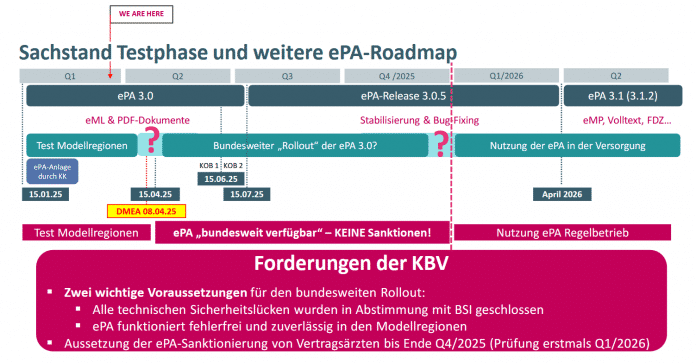Federal Health Minister Prof. Carl Looterback gave an approach to the next steps in the electronic patient file on its keynote speaker at Digital Health Fair DMEA, for which he has now occupied protection for the third time. In the coming weeks, EPAs have to be started in other model areas and to be filled by doctors there. The restrictions will be followed, but only later. When in fact, the minister did not. He promised special rules for the privacy of children and adolescents, which was made to the President of the Association of Pediatrian, Michael Hubman.
Rollout plan for electronic patient file
(Image: KBV)
It is important that electronic patient files for doctors start voluntarily initially. No one should be punished if nothing works that he cannot control themselves, called a lotterback. In the past, the electronic patient file 3.0 had a great criticism of overhangged start. There will be a new rollout plan soon.
“The benchmarks usually reached”
Lauterbach was satisfied with the development of electronic patient files. 280,000 EPAs per week will be opened, the benchmarks usually arrive for the test phase evaluation. Practical management systems are also on the right path. Lauterbach was also convinced about the safety of electronic patient files. Security gaps were discontinued for EPA for mass access, but they did not comment on other defects.
With the EPA, the first insured five percent, patients can better understand in combination with their diseases and AIs. Therefore, EPA patient strengthens autonomy and improves treatment. In complex cases, this is a help, as all data is rarely available. In the future, “simple patients” can be fully supplied digitally. So far, 3.5 million e-rap will be included in the daily and manufactured drugs in the EPA.
E-Rip, Organ Donor Register and EU
As a success of the Federal Health Ministry, the robberback named the e-Rip, the digital organ donor register and the electronic disability certificate, which “properly” works according to his words. Electronic Patient File and Research Data Center Health (FDZ Health) construction, which is located in the Federal Institute for Medicines and Medical Devices, is flowing in daily billing data.
“This means that we will also see a success in very early research and it will later be in such a way that regular data, treatment data, imaging data, genome data, accounting data will be added to the pseudonym, so that this data can be evaluated into the atmosphere of confidential computing,” said the robberbach. Wise language systems can be recorded in data. Laaterbach cited start-up “voize” as an example, which helps in the care sector with documentation. “Many pioneers” are on the road in the health system.
“Digitization is the key”
The robberback looks at the four major challenges for the German health system: very low preventive medicine, very low expertise (especially in the hospital area), very high bureaucracy and very low digitization. However he sees the latter as a “key” to solve three first problems.
Digitization is a basic requirement for AI. It occurs in various areas, which begins with the initial evaluation of emergency patients for Nobel Prices. Among other things, laws on acceleration of digitization in healthcare systems, health data use laws along with health digital agency Act and Ki Regulation that have not yet been passed.
“This train takes a speed that surprises again every few months. And if you look at the Stanford AI index in these weeks, for example, what is new, which is added, it is only unreliable. Artificial intelligence is only incredible. Artificial intelligence is only unreliable. All benchmarks are exceeded, all benchmarks are taken rapidly. Turning test is taken.” “AI expert systems” sometimes do without doctors and will also strengthen doctors.
(Mac)
 European Union Commission: “Aye Gigafabricane” should strengthen Europe’s location
European Union Commission: “Aye Gigafabricane” should strengthen Europe’s location







